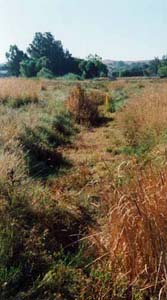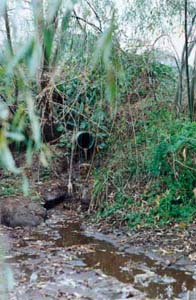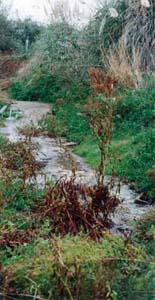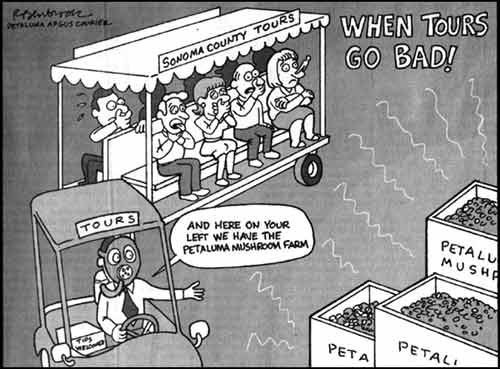"In my over ten years of advocacy on behalf
of the Bay and its watershed, this is the first time I am aware of a local
creek being literally cauterized by animal waste." - Michael Lozeau,
San Francisco BayKeeper 11/1/99![]()
"In my over ten years of advocacy on behalf
of the Bay and its watershed, this is the first time I am aware of a local
creek being literally cauterized by animal waste." - Michael Lozeau,
San Francisco BayKeeper 11/1/99![]()
|
| CA
Regional Water Quality Control Board Compliance Status Report:
CA Regional Water Quality Control Board 7/27/00 - "We are alarmed by the recurrent nature of the illicit discharges at the Petaluma Mushroom Farm and the facility's apparent disregard for the County and State permit requirements. Illicit discharges and inadequate waste management practices have persisted at the facility despite Regional Board's issuance of a Notice to Comply (January 6, 1999) page 1, page 2 and a Notice of Violation (April 30,1999), the Superior Court's Judgement and Permanent Injunction (September 23, 1999), and the County's determination regarding septic system violations." |
| BayKeeper
Action:
These photos of Marin Creek were taken by Baykeeper 11/6/98. They were used by District Attorney Jeff Holtzman in the prosecution of the Petaluma Mushroom Farm in Superior Court. Shown are Marin Creek (dry) upstream of the Farm, the discharge pipe from the Farm directly into the creek, and the creek downstream from the Farm, running with Diazinon contaminated Mushroom Farm waste.    Superior Court
Action:
"Defendant shall, within a period of one year from the date of entry of Judgement (September 23, 1999), relocate its composting operations from its existing location at 782 Thompson Lane"BayKeeper letter 10/19/99 -"a pattern of disregard for both California's water quality laws, as well as a chronic disregard of the requirements set forth in the facility's use permit..." BayKeeper letter 11/1/99 -"Indeed, in my over ten years of advocacy on behalf of the Bay and its watershed, this is the first time I am aware of a local creek being literally cauterized by animal waste." |
| Hazardous
Materials:
The Mushroom Farm is a heavy user of hazardous materials, with an average of 206 pounds per month being applied during a sample period (1/02-3/02). This includes Diazinon (158 pounds per month), Pounce (4.35 pounds per month), Mertect (19.69 pounds per month), and Benlate (24.6 pounds per month); an average 2479 pounds (about 1.25 tons) of regulated toxics used per year. These figures are documented in records on file with the Sonoma County Agricultural Commissioner, see:Mushroom Farm's monthly Pesticide Report, Diazinon application, December 1998, page 1,Page 2. Note that 180 pounds of Diazinon were applied during this month. Lab tests of Wastewater Pond from 4/6/00, on file with WQCB, show that the wastewater contains 28.2 ug/l Diazinon. Lab tests of Wastewater Pond from 12/26/01, on file with WQCB, show that the wastewater contains 51 ppb Diazinon. There has been no testing for the other 3 pesticides used by the Farm. |
| Petaluma Mushroom Farm Odor, as Described by Neighbors |
Previous
News:
|
Petaluma
Mushroom Farm in the News:

Petaluma Argus Courier July 31, 2002
|
"a marginal project gone bad." - Duane Butler, engineer hired by the Petaluma Mushroom Farm, describing the Thompson Lane farm at the January 25, 2001 Sonoma County Board of Zoning Adjustments Hearing. email your questions & comments to The NorthWest Petaluma Rural Alliance